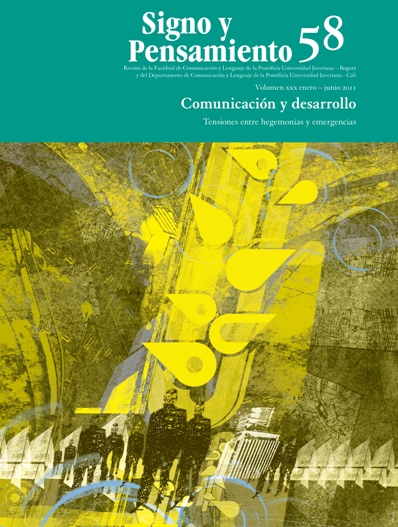Abstract
The way in which society grasps and understands nature takes singular meanings and shapes in different historical contexts, and the way in which this natural world is appropriated, plus its subsequent elaboration and consumption, is a feature frequently researched. Nevertheless, social discourses on nature, which are inextricably linked to new practices and discourses related to development, have a vital importance in the current context of technological transformations and the modernization of agricultural and farming practices. The aim of this article is to analyze the changes that have taken place in the material and symbolic ways in which nature is perceived in the Argentinean Pampas’ Region, particularly in what concerns the increase in the production of genetically modified soy. Thus, our aim is to identify and examine the prevailing metaphors which have emerged vis-à-vis nature, development, and agricultural activity in the midst of this new context.
Barsky, O.; Posada, M., y Barsky A. (1992), El pensamiento agrario argentino, Buenos Aires, CEAL.
Bártoli, M. y Downes, P. (2008), “Cómo será el agro que viene”, Clarín Rural. El nuevo modelo del agro, núm. 2, pp. 4-10.
Calvet, L. J. (2005), Lingüística y colonialismo. Breve tratado de glotofagia, Buenos Aires, Fondo de Cultura Económica.
Clarín Rural (2007), “Las vitaminas justas para que los granos se expresen a pleno”, Clarín Rural [edición especial, La soja que viene], p. 29.
Elustondo, L. (2007), “Creciendo firme de la mano de la tecnología”, Clarín Rural [edición especial, La soja que viene], pp. 26-28.
Escobar, A. (1998), La invención del Tercer Mundo. Construcción y deconstrucción del desarrollo, Bogotá, Norma.
Foucault, M. (1997), Arqueología del saber, Buenos Aires, Siglo XXI.
Gudynas, E. (1999), “Concepciones de la naturaleza y desarrollo en América Latina”, Persona y Sociedad, núm. 13, pp. 101-125.
Harvey, D. (2006), “Acumulación mediante desposesión”, Herramienta, núm. 29.
Iáñez, E. (2007), “Más allá de la revolución verde, ¿un papel para la biotecnología?”, Biotecnología y Sociedad, Instituto de Biotecnología, Universidad de Granada, disponible en http://www.ugr.es/~eianez/Biotecnologia/ agricultura.
Lakoff, G. y Johnson, M. (1986), Metáforas de la vida cotidiana, Madrid, Cátedra Teorema.
Lorenzatti, S. (2007), “El futuro ya está aquí”, Clarín Rural. La ciberagricultura, núm. 1, pp. 4-11.
Mendiola, I. (2006), El jardín biotecnológico: tecnociencia, trangénicos y biopolítica, Madrid, Los Libros de la Catarata.
Naredo, J. M. (1992), “El oscurantismo territorial de las especialidades científicas”, en González-Alcantud, J. y González de Molina, M. (comps.), La Tierra: mitos, ritos y realidades, Barcelona, Anthropos.
Obschatko, E. (1988), “Las etapas del cambio tecnológico”, en Barsky, O. (comp.), La agricultura pampeana: transformaciones productivas y sociales, México, IICA-CISEA, Fondo de Cultura Económica.
Repetto, J. M. (2008), “Semilleros: el valor de la genética”. Clarín Rural. El campo saltó la tranquera, núm. 3, pp. 22-25.
Sevilla Guzmán, E. y González de Molina, M. (eds.) (1993), Ecología, campesinado e historia, Madrid, Las Ediciones de la Piqueta.
Teubal, M, Domínguez, D, Sabatino, P. (2005), “Transformaciones agrarias en la Argentina. Agricultura industrial y sistema alimentario”, en Giarraca, N. y Teubal, M. (comp.), El campo argentino en la encrucijada. Estrategias y resistencia sociales, ecos en la ciudad, Buenos Aires, Alianza.
Toledo, V. (1980), “La ecología del modo campesino de producción”, Antropología y Marxismo, núm. 3, pp. 35-55.
— (1999), “Las ‘disciplinas híbridas’: 18 enfoques interdisciplinarios sobre naturaleza y sociedad”, en Persona y Sociedad, núm. 13, pp. 21-26.
Van der Ploeg, J. D. (1993), “El proceso de trabajo agrícola y la mercantilización”, en Sevilla Guzmán, E. y González de Molina, M. (eds.), Ecología, campesinado e historia, Madrid, Las Ediciones de la Piqueta.
Verón, E. (1998), La semiosis social. Fragmentos de una teoría de la discursividad, Buenos Aires, Gedisa.
This journal is registered under a Creative Commons Attribution 4.0 International Public License. Thus, this work may be reproduced, distributed, and publicly shared in digital format, as long as the names of the authors and Pontificia Universidad Javeriana are acknowledged. Others are allowed to quote, adapt, transform, auto-archive, republish, and create based on this material, for any purpose (even commercial ones), provided the authorship is duly acknowledged, a link to the original work is provided, and it is specified if changes have been made. Pontificia Universidad Javeriana does not hold the rights of published works and the authors are solely responsible for the contents of their works; they keep the moral, intellectual, privacy, and publicity rights.
Approving the intervention of the work (review, copy-editing, translation, layout) and the following outreach, are granted through an use license and not through an assignment of rights. This means the journal and Pontificia Universidad Javeriana cannot be held responsible for any ethical malpractice by the authors. As a consequence of the protection granted by the use license, the journal is not required to publish recantations or modify information already published, unless the errata stems from the editorial management process. Publishing contents in this journal does not generate royalties for contributors.


